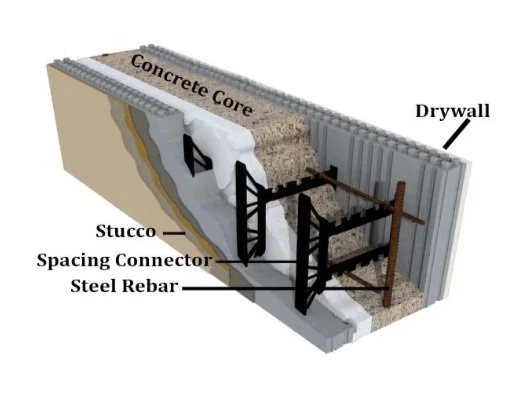
Insulated Concrete Forms
Why Choose an ICF home?
Disaster Resilience
Insulated Concrete Forms (ICFs) are leading the way in disaster-resilient construction. These innovative building materials combine the thermal efficiency of insulation with the structural strength of concrete, yielding homes that are not only energy-efficient but also highly durable against extreme weather conditions.
Strength and Durability
Concrete structures are inherently resistant to wind, fire, and water damage. ICF homes can withstand high winds, making them ideal for hurricane-prone areas, and their fire-resistant nature gives added peace of mind.
Energy Efficiency
ICFs have superior thermal insulation properties, helping to maintain stable indoor temperatures year-round. This reduces reliance on heating and cooling systems, leading to lower energy consumption and decreased greenhouse gas emissions.
Moisture Resistance
The robust construction of ICFs minimizes water intrusion and damage. This is critical in areas susceptible to flooding or heavy rainfall, providing an added layer of protection and longevity to the structure.
Sustainability
ICFs use recycled, expanded polystyrene (EPS) in construction, enhancing durability and longevity of ICF buildings. EPS provides excellent insulation, boosting energy efficiency and preventing moisture issues like mold and rot that can weaken traditional materials. The concrete core, reinforced by EPS, withstands environmental stresses, ensuring structural integrity. This combination results in lower maintenance and repair costs, making ICF homes a smart investment for lasting structures.
Sound Insulation
The dense construction of ICFs offers excellent acoustic insulation, helping to provide a quieter and more comfortable living environment, which is particularly valuable in urban settings.
Low /Zero Net Energy Cost Savings
ICFs provide superior thermal insulation, reducing heating and cooling costs by maintaining a consistent indoor temperature year-round. This energy-efficient design minimizes the need for excessive climate control, lowering utility bills and shrinking your carbon footprint.
Insurance
ICF (Insulated Concrete Form) homes not only offer superior energy efficiency and durability but also provide significant advantages when it comes to insurability and insurance costs. Built to withstand extreme weather conditions, ICF homes minimize the risk of damage from natural disasters, leading to lower premiums from insurance providers. Their robust construction reduces the likelihood of mold and structural issues, further streamlining the insurability process. Investing in an ICF home means not only a resilient living space but also long-term savings on insurance.
$
Investing in ICF technology is a forward-thinking approach to building homes that stand resilient against the challenges posed by climate events. As we advance towards a more sustainable future, ICF homes exemplify a harmonious blend of innovation and practicality, ensuring safety and comfort for generations to come. By selecting ICFs for construction, homeowners contribute not only to their own well-being but also to a more sustainable and resilient built environment.





